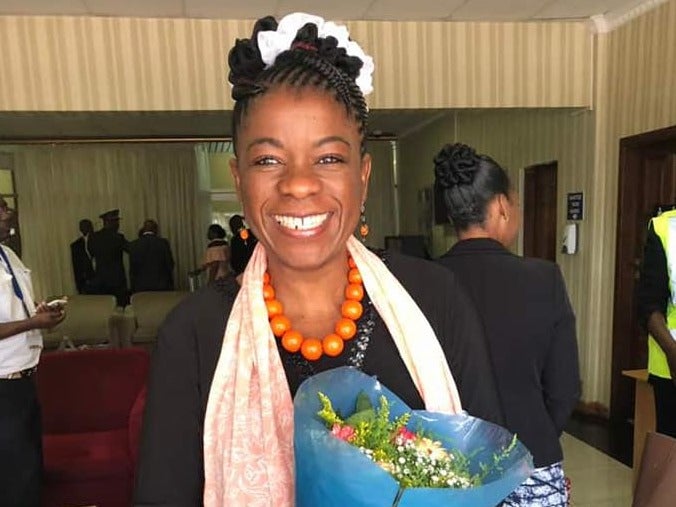Brenda Muntemba: Zambian diplomat appointed by Unicef to empower girls and women
Communication skills she honed as a police spokesperson ensured her place as a leading figure in her country’s public life

Your support helps us to tell the story
From reproductive rights to climate change to Big Tech, The Independent is on the ground when the story is developing. Whether it's investigating the financials of Elon Musk's pro-Trump PAC or producing our latest documentary, 'The A Word', which shines a light on the American women fighting for reproductive rights, we know how important it is to parse out the facts from the messaging.
At such a critical moment in US history, we need reporters on the ground. Your donation allows us to keep sending journalists to speak to both sides of the story.
The Independent is trusted by Americans across the entire political spectrum. And unlike many other quality news outlets, we choose not to lock Americans out of our reporting and analysis with paywalls. We believe quality journalism should be available to everyone, paid for by those who can afford it.
Your support makes all the difference.Praised as a humble Christian who wanted to help the less fortunate, diplomat Brenda Muntemba was a leading public figure in Zambia. A former police officer, Muntemba, rose through the ranks to become her country’s ambassador to Kenya.
Born in the town of Kitwe to Bradley Chesters Muntemba and Hilary Kalenga, Brenda Chipowe Muntemba was the second of three girls. Her father was an officer in the Zambia Police Service, serving as commanding officer for the country’s Central province. Her mother was a member of the Mung’omba Constitution Commission, which in 2001 replaced the Mwanakatwe Commission of 1996 and was charged with writing a new constitution for the country.
Muntemba, who grew up in the Zambian capital Lusaka, graduated from the University of Zambia with a BA in French and economics in 1993. Upon graduation, she worked as a high school teacher for two years before following in her father’s footsteps to join the police service in 1996. She would later gain a masters in translation from the Marc Bloch University in Strasbourg. She also studied leadership under schemes run by both the American and British governments.
Muntemba was the Zambian Police spokesperson from 2002 to 2006, during which time the British satirist Roy Clarke was arrested and nearly deported after calling the country’s then president, Levy Mwanawasa an elephant.
In 2004, she talked to the BBC World Service about domestic violence across the African continent; she saw economic empowerment as key to improving women’s lives.
At the time 80 per cent of Zambians lived below the poverty line, with a life expectancy of just 35 years and one in 10 of the population living with HIV. Today, 60 per cent are below the poverty line, while HIV affects 14.3 per cent of adults).
During her time as police spokesperson, Unicef appointed Muntemba as a role model for the education of girls. Muntemba was passionate about women’s rights and published four motivational books: Off Duty (2011), a collection of poetry and philosophical musings; In Retrospect (2013) and Secrets Unveiled (2016) which set out to empower women and girls; and The Architect, which celebrates her relationship with God.

Explaining her ethos, she once said: “We are each unique, as ordinary as some may think themselves to be We each have the task to unleash our full potential before we reach the finish line. We must give life our all.”
In 2011, Muntemba ,was appointed police commissioner for Zambia’s Southern province. A year later, she spent a short time as Commissioner of Operations before transferring to the cabinet office of president Michael Sata.
At the ministry of education she became Zambia’s chief programmes officer for Unesco.
In 2015, Muntemba joined the foreign service, becoming Zambia’s high commissioner to Kenya in April of that year. She was also permanent representative to the United Nations Office in Nairobi, with a jurisdiction covering the republic of South Sudan, the State of Eritrea and the Republic of Seychelles. Meeting Danny Faure, president of the Seychelles, in 2017, Muntemba said of the relationship between their two countries: “When you have peace, you don’t keep it to yourself, you spread it.”
Muntemba married the Reverend Sulanji Andrew Sichilembe in 2006. Church was a big part of Muntemba’s life and she herself was ordained as a pastor in 2012. In her spare time, she enjoyed singing – she recorded and made videos of a number of songs – and was a part-time radio presenter for Christian Voice and Radio Phoenix.
Returning to Nairobi from a meeting on 26 February, Muntemba’s car was involved in a head on collision with a trailer on the Mombasa-Nairobi highway. She died weeks later aged 49. Muntemba is survived by her husband, who has announced a foundation to be set up in her honour, and her children Mwango Kondolo and Lukundo Nachilembe.
Brenda Muntemba, diplomat and author, born 2 July 1970, died 19 March 2019
Join our commenting forum
Join thought-provoking conversations, follow other Independent readers and see their replies
Comments